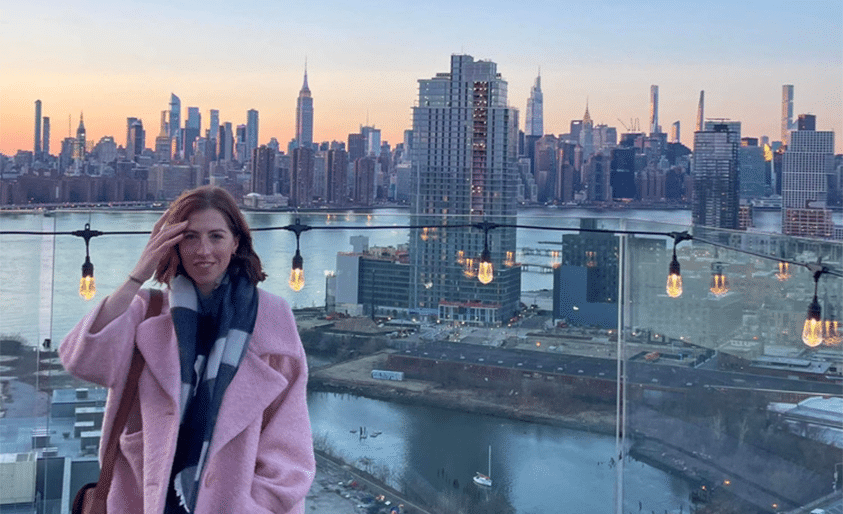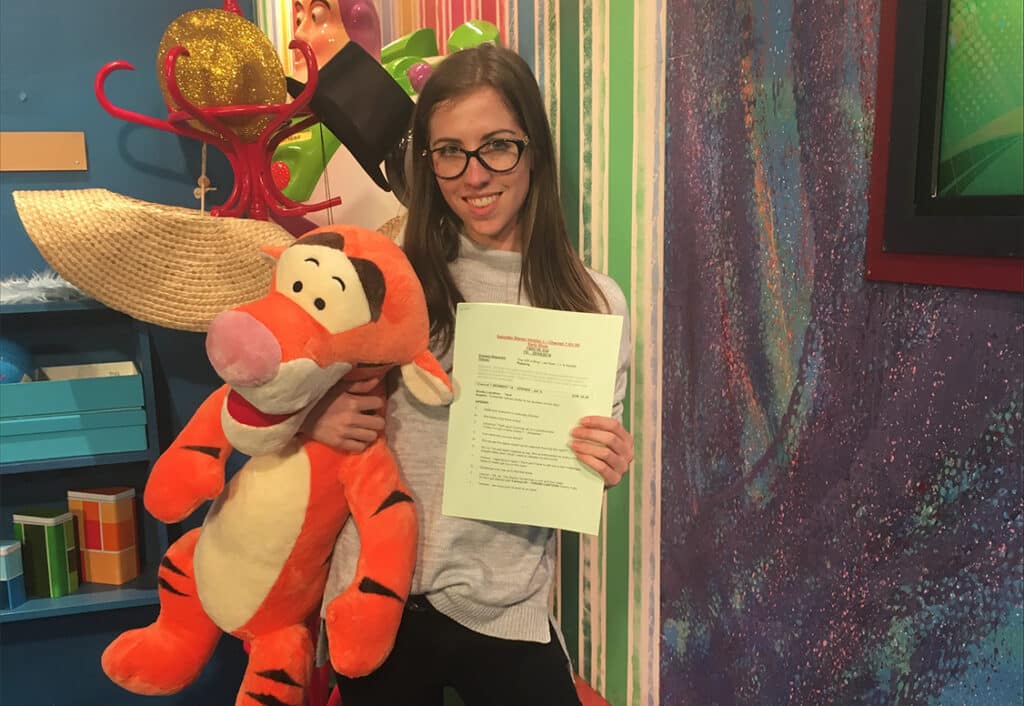Emily Lefroy (2010): From Santa Maria Boarder to Senior Reporter

Emily Lefroy (2010) takes us on a captivating journey, recounting her transition from the boarding houses of Santa Maria to the city that never sleeps. She delves into the teachers who left the most profound impact on her, what prompted her relocation to the United States, and offers a glimpse into the realities of working in the media industry.
Can you share with us your pursuits and professional endeavours since your time at Santa Maria?
After graduating from Santa Maria in 2010, I decided to study a Bachelor of Communications, majoring in journalism and broadcasting at ECU. After graduating, I went on to complete a postgraduate degree in broadcasting, also at ECU.
I was fortunate to be awarded a production internship at Channel 7 in Sydney after graduating and moved over in early 2015. The three-month internship started at Better Homes and Gardens, but I was then lucky to get the opportunity to work as a production assistant for Saturday Disney, and went on to work across a number of TV shows such as Better Homes and Gardens, House Rules, The Living Room, and the kids’ TV shows Get Arty and Get Clever.
I was so lucky to be given the chance to work as a writer and producer in kids’ TV for a number of years before making the change to digital journalism in 2019, working as a reporter for Channel 9 and Yahoo News. I had always wanted to work and live in New York and was offered a role working for the New York Post in the US as a reporter, and recently accepted a job as a senior reporter for the Daily Mail US.
Do you have any memorable anecdotes or recall any influential teachers from Santa Maria that you would be willing to share?
I was lucky to have so many wonderful teachers at Santa Maria. In particular, I remember my Year 11 English teacher, Mrs McManus, and my history teacher for Years 11 and 12, Mr Sheehan.
I was a boarding student and I have so many great memories from school. I’m also lucky to still be able to call my school friends some of my best friends today.
Could you provide us with a glimpse into a typical ‘day in the life of a senior reporter’?
I work from the office every day, so get to work around 8.00 am. When I arrive, my editor will often assign me a story, usually something more urgent or breaking that the Australia or UK team haven’t done overnight. After that, I’ll pitch some ideas to the editors and work through various stories throughout the day. Occasionally if there’s a breaking story, I’ll divert to that, or work on longer-form pieces that involve more in-depth interviews and research.
Reflecting on your career thus far, what stands out as your most significant achievement?
When I was at Saturday Disney, I was fortunate enough to be given the opportunity to write a few episodes, which was an amazing experience. Moving to New York was also a huge accomplishment!

Have you encountered any challenges? If so, how did you overcome these?
Absolutely, the media is a fickle industry, and working in this industry, particularly in TV, can be tough at times. TV production involves a lot of short-term contracts, and the time in between can be very stressful. Sometimes, TV shows are cancelled or restructured, which can make you doubt yourself and your abilities.
Working in journalism can also be difficult because there are a lot of confronting stories you’re faced with and some difficult situations and stories you must share.
Having good mentors and people I can talk to within my industry have definitely helped to overcome challenges at work.
Your transition from producer to reporter is an interesting shift. What motivated this transition, and what do you consider to be the key differences between these roles?
I have always loved writing, which is originally what made me want to work in the media. When the kid’s show I was working on came to an end, I was given the opportunity to start working as a journalist at Channel 9 as a digital reporter and started a job there.
The key difference between the two is how the mediums are delivered. Being a TV producer entails having to know what camera angles to use and having general knowledge of how a piece will cut together in the edit suite, which means working with the editors and cameraman.
Journalism is very fast paced, so the speed at which stories had to be turned around was the biggest adjustment.
Who or what inspired you to work in the media industry?
I always loved public speaking, which initially sparked my desire to pursue broadcast journalism. My love for public speaking was fostered during my school years. Additionally, my English teachers’ encouragement motivated me to explore my passion for writing, while my interest in media and entertainment further fueled my aspirations.
In the fast-paced world of media, maintaining a work-life balance is essential. How do you unwind and recharge?
New York is a very social city, and I have made some amazing friends who all live close by. So, I always have some friends to catch up with or talk to after a long work day or on the weekend. I also love running and enjoy a nice long run on the weekend, especially as it’s a great way to explore the city. It’s always a thrill to run through Central Park – it’s a real ‘pinch me I live in New York moment!’
If you could offer one piece of advice to students aspiring to work within the media industry, what would it be?
It can be a tough industry, but absolutely stick it out because it is also a lot of fun. Additionally, it is a small industry, regardless of the country, and a significant number of jobs arise from word of mouth and connections made, so always treat everyone with respect.
It’s also a highly collaborative industry, so it’s important to be able to work well with others and be able to listen to what’s going on around you. I have been fortunate to secure numerous roles through recommendations from colleagues I have worked with in the past. It’s therefore very important to treat everyone with respect and to strive for your absolute best on every project. You never know who your next boss will be!
We’d like to thank Emily for taking the time to share her words of wisdom, and exciting journey with us and congratulate her on all her success.

Combating The Attention Span Crisis In Our Students – Jennifer Oaten
It is no secret that attention spans have been steadily declining, especially among younger generations growing up immersed in digital technology. The average person’s attention span when using a digital device has plummeted from around two and a half minutes back in 2004 to just 47 seconds on average today – a dramatic 66% decrease over the past two decades.

With Laurissa Knowles From Valley Depths to Mountain Peaks (1993)
Laurissa Knowles (1993) has had an incredible career journey so far, from Santa Maria College Teacher to Celebrant and Councillor.

Elevating Spaces: Diana Ellis’ Signature Touch & Architecture Magic
What happens when you mix a love for art, travel, nature, and creativity with construction and building? You get the essence of Diana Ellis’ career!
- Adapbtability, alumni, Collaboration, Confidence, Curiosity, Featured
Author: Santa Maria College
Santa Maria College is a vibrant girls school with a growing local presence and reputation. Our Mission is to educate young Mercy women who act with courage and compassion to enrich our world. Santa Maria College is located in Attadale in Western Australia, 16 km from the Perth CBD. We offer a Catholic education for girls in Years 5 – 12 and have 1300 students, including 152 boarders.






